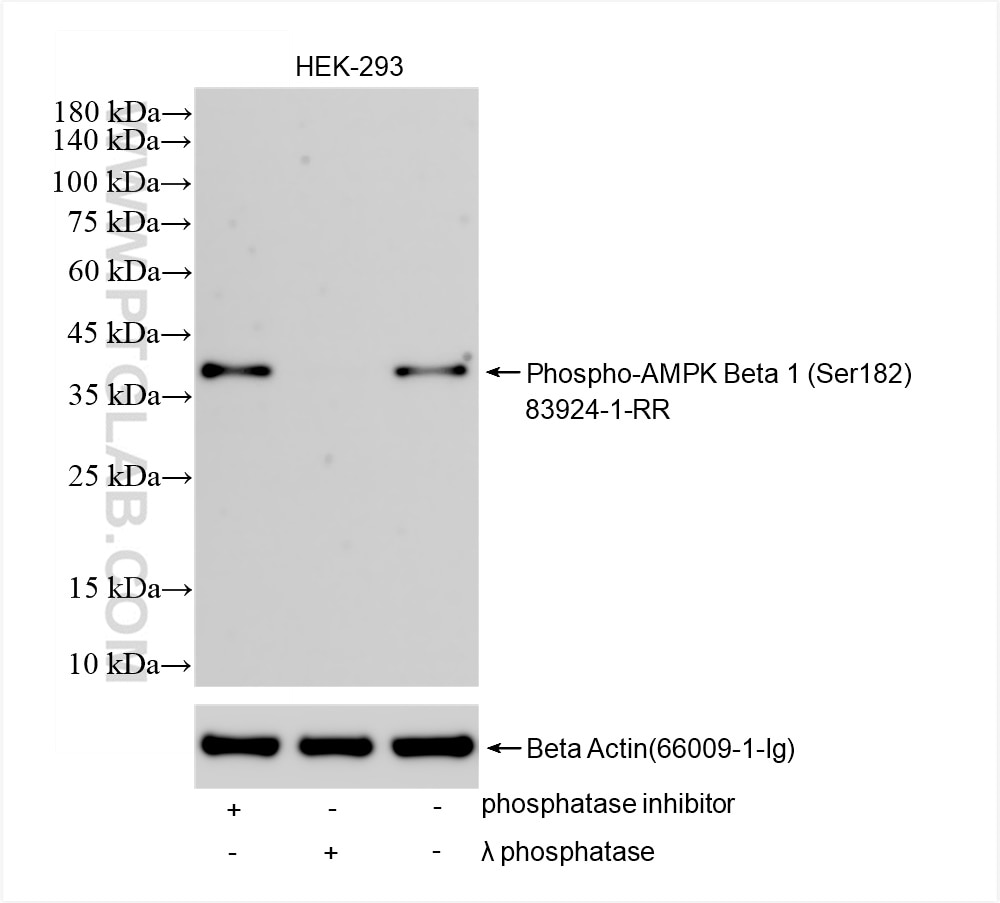Anticorps Recombinant de lapin anti-Phospho-AMPK Beta 1 (Ser182)
Phospho-AMPK Beta 1 (Ser182) Recombinant Antibody for WB, ELISA
Hôte / Isotype
Lapin / IgG
Réactivité testée
Humain et plus (3)
Applications
WB, ELISA
Conjugaison
Non conjugué
CloneNo.
240628B1
N° de cat : 83924-1-RR
Synonymes
Galerie de données de validation
Applications testées
| Résultats positifs en WB | cellules HEK-293, λ phosphatase treated HEK-293 cells |
Dilution recommandée
| Application | Dilution |
|---|---|
| Western Blot (WB) | WB : 1:500-1:1000 |
| It is recommended that this reagent should be titrated in each testing system to obtain optimal results. | |
| Sample-dependent, check data in validation data gallery | |
Applications publiées
| WB | See 11 publications below |
Informations sur le produit
83924-1-RR cible Phospho-AMPK Beta 1 (Ser182) dans les applications de WB, ELISA et montre une réactivité avec des échantillons Humain
| Réactivité | Humain |
| Réactivité citée | rat, Humain, porc, souris |
| Hôte / Isotype | Lapin / IgG |
| Clonalité | Recombinant |
| Type | Anticorps |
| Immunogène | Peptide |
| Nom complet | protein kinase, AMP-activated, beta 1 non-catalytic subunit |
| Masse moléculaire calculée | 38 kDa |
| Poids moléculaire observé | 38 kDa |
| Numéro d’acquisition GenBank | BC001007 |
| Symbole du gène | PRKAB1 |
| Identification du gène (NCBI) | 5564 |
| Conjugaison | Non conjugué |
| Forme | Liquide |
| Méthode de purification | Protein A purfication |
| Tampon de stockage | PBS with 0.02% sodium azide and 50% glycerol |
| Conditions de stockage | Stocker à -20°C. Stable pendant un an après l'expédition. L'aliquotage n'est pas nécessaire pour le stockage à -20oC Les 20ul contiennent 0,1% de BSA. |
Informations générales
AMPK Beta 1 (5'-AMP-activated protein kinase subunit beta-1) is also named as PRKAB1 and AMPK. AMPK, a serine/threonine kinase that exists as a heterotrimer comprised of a catalytic α-subunit and regulatory β- and γ-subunits, has been recognized as a sensor of cellular energy homeostasis (PMID: 21937710). AMPK regulates key metabolic enzymes, cell growth, apoptosis, gene transcription, and protein synthesis (PMID: 12829246). AMPK is an energy sensor and plays an essential role in the control of cellular bioenergetics by responding to various stresses including those that induce changes in the cellular AMP:ATP ratio or modulation in intracellular calcium (PMID: 27812976, PMID: 26616193). Recent studies have shown that AMPK mediates the inhibition of cell proliferation and growth of tumor cells (PMID: 16613876). AMPK also inhibits the expression of Glut1 and glycolysis in Tregs by inhibiting mTORC1 signaling (PMID: 25477880). This antibody recognizes phosphorylated AMPK Beta 1.
Protocole
| Product Specific Protocols | |
|---|---|
| WB protocol for Phospho-AMPK Beta 1 (Ser182) antibody 83924-1-RR | Download protocol |
| Standard Protocols | |
|---|---|
| Click here to view our Standard Protocols |
Publications
| Species | Application | Title |
|---|---|---|
Front Nutr Luteolin attenuates LPS-induced damage in IPEC-J2 cells by enhancing mitophagy via AMPK signaling pathway activation | ||
Anal Cell Pathol (Amst) Shikonin Induces Autophagy and Apoptosis in Esophageal Cancer EC9706 Cells by Regulating the AMPK/mTOR/ULK Axis | ||
Cell Signal Targeted therapy for KIF3C: A study on the mechanism of combined therapy with KIF3C signaling pathway, afatinib, and MT-DC (ac)phosphoramide in regulating gastric cancer cell proliferation | ||
Nutrients Protective Effects of Isostrictiniin Against High-Fat, High-Sugar Diet-Induced Steatosis in MASLD Mice via Regulation of the AMPK/SREBP-1c/ACC Pathway | ||
Biomaterials Selective and iron-independent ferroptosis in cancer cells induced by manipulation of mitochondrial fatty acid oxidation | ||
Diabetes Metab J Shionone Inhibits Glomerular Fibirosis by Suppressing NLRP3 Related Inflammasome though SESN2-NRF2/ HO-1 Pathway |


